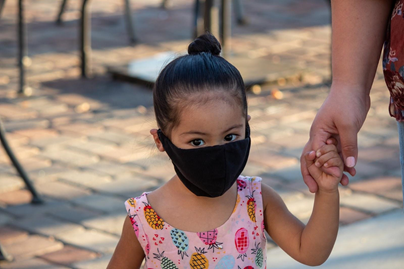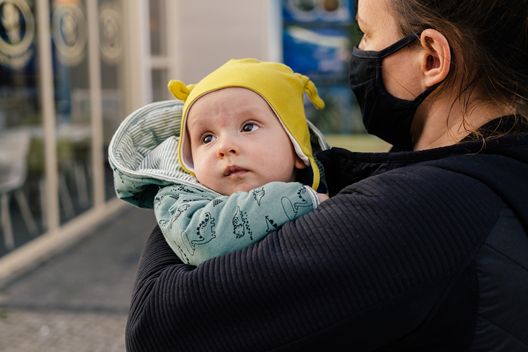10.3: The COVID-19 Pandemic- Proof of the Importance of Quality Learning Experiences
- Page ID
- 139904
COVID-19 and Quality Care
COVID-19 (coronavirus disease 2019) is a disease caused by a virus named SARS-CoV-2 and was first discovered in December 2019 in Wuhan, China. The virus spread throughout the world and in the spring of 2020, many schools and childcare centers in the U.S. closed in an effort to reduce its spread and impact.
The COVID-19 pandemic presented a unique opportunity to explore the importance of learning experiences on the cognitive development of infants and toddlers as the childcare arrangements of children changed. Compared to toddlers born before the pandemic, children born during the pandemic showed lower scores in cognition, language and motor abilities as toddlers (Deoni, Beauchemin, Volpe & D'Sa, 2021; Huang et al.m 2021; Shuffrey et al., 2021). The negative cognitive impact was greatest for boys and for children from lower socioeconomic backgrounds. These results suggest the pandemic somehow changed learning experiences enough to make a significant impact on the experiences that support optimal cognitive development. Although there are various potential contributing factors that could be argued to explain these results (e.g., reduced social interaction, increased screen time, increased parental stress, etc.,), one significant contributing factor was the care and educational experiences infants and toddlers received during the pandemic. [1]

During the early months of the pandemic childcare arrangements shifted. Some childcare providers closed temporarily and later opened with strict protocols. Many children, instead of attending a group care program, stayed home under the care of parents and extended family. The various experiences infants and toddlers received during the pandemic had an impact on their cognitive development.
One study examined how childcare arrangements during the pandemic impacted cognitive growth in infants and toddlers (Davies et al., 2021). Their data revealed that children who attended infant and toddler group care programs during the pandemic showed greater cognitive growth, regardless of their socioeconomic background. The benefits of attending infant and toddler group care programs for cognitive development, compared to other childcare arrangements such as care from a family member, may be due to group care programs being more likely to implement developmentally appropriate learning materials and adult-child interactions which scaffold learning, and have been shown to promote early cognitive development (Clark et al., 2013; DeJoseph, Sifre, Raver, Blair, & Berry, 2021; Rosen et al., 2020). [3]
Interestingly, compared to children who attended infant and toddler group care programs, informal childcare by family members did not show the same benefits for cognitive growth (Davies et al., 2021). Although the overall evidence is mixed regarding the cognitive benefits of informal childcare (Green, Pearce, Parkes, Robertson, & Katikireddi, 2020; Hansen & Hawkes, 2009; Laing & Bergelson, 2019; Melhuish et al., 2015), the strengths of infant and toddler group care programs, such as caregiver-child interactions, predictable schedules, lower screen use, and caregiver education is likely to be important for supporting cognitive growth (Dowsett, Huston, Imes, & Gennetian, 2008). [3]

The handful of studies that have examined the impact of the COVID-19 pandemic on the cognitive development of infants and toddlers have highlighted the role learning experiences have in supporting cognitive development. In particular, the quality of the care and educational experiences infants and toddlers receive are related to their cognitive growth. These findings further document the significant role infant and toddler caregivers have in creating safe and high quality contexts that contribute to the trajectory of cognitive development in children.
In the next section we will discuss four factors of infant and toddler quality group care that support cognitive development: environments, materials, experiences and interactions.
[1] “Basics of COVID-19” from the CDC is in the public domain.
[2] Image from Leo_Fontes on Pixabay.
[3] Davies et al., (2021). Early childhood education and care (ECEC) during COVID‐19 boosts growth in language and executive function. Infant and Child Development, e2241. CC by 4.0
[4] Image from marcinjozwiak on Pixabay

